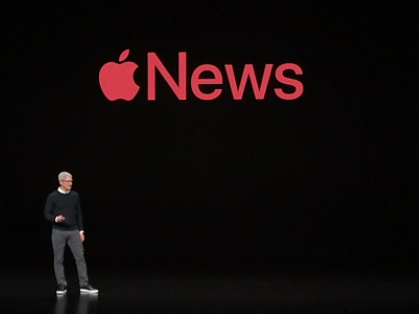
Publishers are concerned that a technical change to Apple’s software will lead to traffic being diverted from their websites to Apple News+.
Apple, which has not responded to Press Gazette requests for comment, has been accused of making an “aggressive move” to “intercept” news partners’ readership.
Publishing industry figures spoken to by Press Gazette say the change, which emerged earlier this week, has caused “a lot of unhappiness” in the sector.
What has happened?
On Monday, Tony Haile – the chief executive of Scroll, a tech startup that offers subscribers ad-free access to certain news websites – picked up on a small change to the settings on Apple’s new iOS14 operating system.
The tweak means that publishers featured on Apple News+ are seeing links to their websites being directed straight to the Apple News app from the standard Safari internet browser.
The new rule only appears to currently affect Apple News+ subscribers, who can opt to change their settings.
Woah, I wonder how many publishers in Apple News+ realize that the new iOS14 and MacOS Big Sur are by default intercepting traffic to their sites and sending it to the Apple News app instead. pic.twitter.com/k4PQG9mE7M
— Tony Haile (@arctictony) August 10, 2020
Haile, who demonstrated the settings shift using a link to The Atlantic magazine’s website (above), said this “directly cannibalises a publishers’ core subscription audience”.
The tech giant launched Apple News+ – a premium version of the free Apple News app that costs $9.99 a month in the US or £9.99 a month in the UK – last year.
While large numbers of news outlets make some of their content available on the basic app, Apple News+ has only a few newspaper partners – including the Wall Street Journal, LA Times and the Times and Sunday Times in the UK – in addition to dozens of magazines.
It is unclear whether the rule change will remain in place, but if it does, it could enrage Apple’s news partners.
Apple acting like ‘Darth Vader’
Adam Singolda, the chief executive of Taboola – which, like Scroll, competes with Apple News as a news aggregator – accused Apple of attempting to build a “walled garden”, where users need only rely on its own app to access news content.
“We live in an attention economy where so many companies are fighting for attention – and there’s a budget for how much attention people have,” he told Press Gazette. “Because of that trend, fighting for attention across different apps and games, the value of the relationship a publisher has with the user direct is even more important than ever.
“It’s not enough to have someone reading your content elsewhere. That’s a good marketing vehicle. But the goal always has to be, ‘I want them on my site all the time – I want that relationship to be direct.'”
He drew comparisons between Apple News and an early version of Facebook Instant Articles, which kept readers on the social media site rather than directing them on to news websites.
“That was a huge mistake by Facebook,” he added. “They chose themselves over their partners, the ecosystem, and that was not good for publishers. And eventually, the New York Times left Instant Articles and then other people left.
“Apple News could have chosen to go a little bit evil like Facebook Instant Articles, or chosen to do the right thing. Do they want to be a Jedi or Darth Vader? They’re both powerful, but you have to choose one. Jedi would be you send a lot of traffic, quality readership and support to journalism. And Darth Vader would be intercept relationships – keep people in, walled gardens, closed.”
He suggested Apple was heading in the wrong direction, describing its new publisher traffic grab as an “aggressive move” against publishers.
Tom Coates, a product and design professional who has worked for the BBC, Yahoo and Time Out, also took issue with Apple’s move.
Speaking to Press Gazette, he suggested that the settings change could prove “a really big deal”. “It seems reasonable to be concerned about it,” he added.
David Chavern, president and chief executive of the News Media Alliance – a trade body that represents 2,000 news organisations across the US – said there was “a lot of unhappiness about the lack of notice about the change” in the industry. The NMA has yet to formally comment on the policy.
Email pged@pressgazette.co.uk to point out mistakes, provide story tips or send in a letter for publication on our "Letters Page" blog
